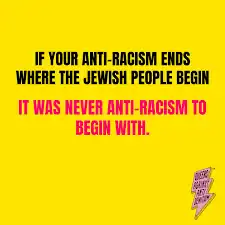By Morgan Grady
Across the U.S. and in Cleveland in particular, rising antisemitism and anti-Black racism are not separate phenomena. They are interconnected expressions of extremist ideology. The far right imagines America as a white Christian nation, and both forms of hate fuel this vision.
According to the Southern Poverty Law Center, antisemitism acts as “connective tissue” among extremist groups. The 2017 Unite the Right rally in Charlottesville made this connection plain, with chants of “Jews will not replace us” revealing how antisemitic ideology threads through white supremacist violence.
The Great Replacement Theory and Interlocking Hatreds
White nationalists often invoke the “Great Replacement Theory,” a conspiracy rooted in early 20th-century European nationalism. It claims that Jewish elites promote immigration by nonwhite populations to weaken white dominance. In this framing, Jews are seen as manipulative conspirators, while Black people are cast as visible threats to white order. This dynamic has motivated mass shootings in Charlottesville, Pittsburgh, and Buffalo.
This racialized distinction of threat and covert influence versus visible presence reinforces how white supremacists cast Jews as conspirators and Black people as contaminants.
Historical Friction and Contemporary Misunderstandings
Historically, Jewish and Black communities in the U.S. have often stood in solidarity, especially during the civil rights era. Yet that alliance has also experienced tension. In his 1967 essay “Negroes Are Anti-Semitic Because They’re Anti-White,” James Baldwin argued that Black resentment toward Jews stemmed not from religious difference, but from Jewish proximity to white privilege.
Scholar Eddie S. Glaude Jr. expands on this in Democracy in Black, noting that antisemitic rhetoric among some Black thinkers reflects alienation from systems of power, not “pure bigotry.” The Nation of Islam’s writings often stoke these tensions, sparking fear while also revealing deeper frustrations with inequality.
Cultural Frustration in the Entertainment Industry
These tensions surfaced again in 2022 when Kanye West made antisemitic remarks, accusing Jewish executives of profiting from Black suffering. In an interview with Lex Fridman, he claimed the industry promoted “genocide and population control” through Black music.
Others have voiced similar concerns without resorting to hate. In a 2020 Advocate op-ed, Cardi B criticized the male-dominated industry for commodifying her sexuality: “The songwriters are men. The producers are men. The video director is a man. The record label is run by men.”
Megan Thee Stallion echoed this in Rolling Stone in 2021, saying labels “package our pain and our struggle for clicks and streams.”
Philosopher Theodor W. Adorno warned that scapegoating Jews as symbols of capitalism evades meaningful critique of structural power. Symbolic blame, he argued, obscures the real machinery of inequality.
Rising Hate in Ohio
In Ohio, these dangers have become urgent. The Anti-Defamation League recorded 233 antisemitic incidents in 2024, including swastika graffiti at Sherwin-Williams, threats to synagogues, and neo-Nazi marches in Columbus.
A tragic reminder came with the murders of Yaron Lischinsky and Sarah Milgrim in Washington, D.C. a targeted antisemitic attack that reverberated in Northeast Ohio. In response, Clevelanders gathered in a unity rally holding signs reading “Cleveland is Stronger Than Hate,” with Rep. Shontel Brown reminding attendees: “The rise in antisemitism is not a Jewish problem alone. It is a reflection of our society’s failure to root out hate wherever it lives.”
Resisting Division, Embracing Solidarity
Antisemitism and anti-Blackness must not be understood in competition, but in relation—as distinct yet connected tools of racial capitalism and cultural domination. Any meaningful response to extremism must reject the urge to rank oppressions, and instead dismantle the systems that make both hatreds thrive.
Call to Action
Our communities are strongest when we face difficult truths together. We welcome your voices, your experiences, and your stories as we continue reporting on issues of race, equity, and justice. Contact us to contribute to this ongoing conversation.





